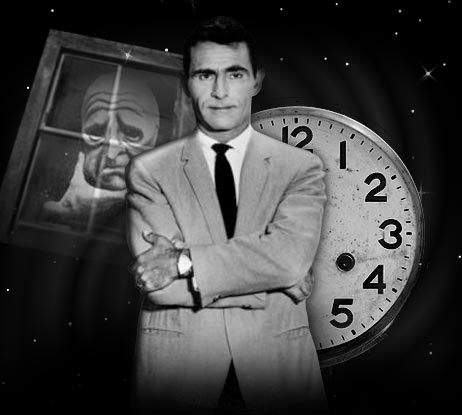It's 50 years since The Twilight Zone made its TV debut. To mark the anniversary of this classic fantasy anthology, here's another chance to read a celebration of the series first published way back in SFX 50...

Submitted for your approval, a man and his stories. His name is Rod Serling. You will find him standing sideways to reality, occasionally smoking, always impeccable. "There is a fifth dimension beyond those known to man," he will tell you, with a soft, wise voice, a voice you would trust to show you Hell, madness or the future and still see you safely home. "It is a dimension vast as space and timeless as infinity. It is a middle ground between light and shadow, between the pit of his fears and the summit of his knowledge. This is the dimension of imagination. It is an area we call...The Twilight Zone."
Cue the familiar uneasy notes of the show's opening theme, the ones we all hum in off-key fashion whenever anything even faintly strange or implausible drifts through our lives. That's a measure of how truly iconic The Twilight Zone remains; a television show that transcended television and became a shorthand for the fantastic. It is, simply, the finest fantasy anthology series ever to cast dark and marvellous shadows on the small screen.
As creator, host, main writer, executive producer and knowing, unfathomable face of The Twilight Zone, Rod Serling is inextricable from the series. A prolific, Emmy-winning scriptwriter, Serling's talent blossomed in the formative days of television, the young medium hungry for his fiercely humanistic stories. His tales fought moral causes, took sides, bothered consciences. Naturally, network advertisers loathed him. And so Serling, so driven to tell tales that his nights of insomnia found him muttering plots into his bedside dictaphone, sought to smuggle his concerns under the guise of the unbelievable.
A pilot episode for Desilu Playhouse was warmly received. A tale of a time traveller frantically warning the past of Pearl Harbour, The Time Element set the template for the series, an outlandish morality tale with a killer twist. Ratings were strong enough for Serling to sell the concept to CBS, with viewers first offered "Next stop...The Twilight Zone" in October 1959, just as the first wave of television anthology shows were fading from the screen. Quirky, haunting and heartfelt, The Twilight Zone proved the worth of the format, half hour episodes that spanned the human condition and all its power and foibles.

Serling's vision was one of a dark folksiness, a sense of fantastical Americana shared by Ray Bradbury, who soon contributed to the series. There was a darkness at the edge of town, but it was invariably a warm darkness, one that reminded you that you could find magic in the ordinary, especially at night. These were folk tales, fables, the redemptions of down and out boxers or Confederate soldiers tempted by the Devil himself. In Where Is Everybody?, a lone man races around the deserted streets of a small town, yearning for human company. The Twilight Zone reminds us that human company is the stuff of wonder, and something to wish for.
Even the story titles evoke this unique, smoky monochrome world, from the paranoid suburbia of The Monsters Are Due on Maple Street to the simply intriguing The Sixteen-Millimetre Shrine. Trawl the plots and you will find fuel for endless films. Each plot is a perfect pitch. Demons on aeroplane wings. Robotic baseball players. Phonecalls from the cemetery. The Truman Show should have ended with the ghost of Rod Serling dispensing his wisdom, but The Twilight Zone had already shown us a man trapped in his own movie in A World of Difference.
Get sneak previews, exclusive competitions and details of special events each month!
Never scaling the ratings, the series became a cult hit in syndication. Even now, somewhere in the world, some strange channel will transport you to Rod Serling's dimension of sight and sound, a place we still call...The Twilight Zone.
Nick Setchfield
SFX Magazine is the world's number one sci-fi, fantasy, and horror magazine published by Future PLC. Established in 1995, SFX Magazine prides itself on writing for its fans, welcoming geeks, collectors, and aficionados into its readership for over 25 years. Covering films, TV shows, books, comics, games, merch, and more, SFX Magazine is published every month. If you love it, chances are we do too and you'll find it in SFX.


